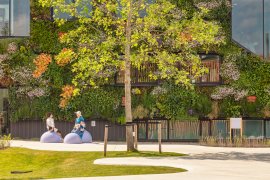Urban Futures Research Programme
We study the processes and governance arrangements that foster resilience, economic development, health, and inclusion and equality in cities and urban regions. Our research on challenges surrounding sustainability, open societies and youth contributes to three of the four Strategic Themes of Utrecht University. Research sections work across research themes in interdisciplinary projects together with societal partners.
Recent publications
2024
Jahangir, S., Bailey, A., Hasan, M. U., & Hossain, S. (2024). “We do not go outside, though We want to”: Unequal Access to Public Transport and Transport-Related Social Exclusion of Older Adults in Dhaka, Bangladesh. Journal of Applied Gerontology. Advance online publication. https://doi.org/10.1177/07334648241231156
Doran, C., Duits, A. J., Gerstenbluth, I., Tami, A., & Bailey, A. (2024). Adaptive coping strategies among individuals living with long-term chikungunya disease: a qualitative study in Curaçao. BMJ Open, 14(2), Article e076352. https://doi.org/10.1136/bmjopen-2023-076352
2023
Doran, C., Duits, A., Tami, A., Gerstenbluth, I., & Bailey, A. (2023). “It’s very saddening, you keep on wondering when the symptoms will be over”: A qualitative study exploring the long-term chikungunya disease impact on daily life and well-being, 6 years after disease onset. PLoS Neglected Tropical Diseases, 17(12), Article e0011793. https://doi.org/10.1371/journal.pntd.0011793
Mukesh, H. V., & Bailey, A. (2023). Bringing context to the foreground: Explaining the early-stage career development of next-generation family business members. Journal of Family Business Strategy, 14(4), Article 100572. https://doi.org/10.1016/j.jfbs.2023.100572
Mulderij-Jansen, V., Gerstenbluth, I., Duits, A., Tami, A., & Bailey, A. (2023). Contexts motivating protective behaviours related to Aedes-borne infectious diseases in Curaçao. BMC Public Health, 23(1), Article 1730. https://doi.org/10.1186/s12889-023-16624-5






